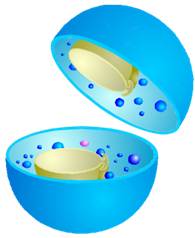About Us
 Our laboratory was established in 1988 at the Department of Physiology and Cell Biophysics, University of Virginia. Our major research topics were the molecular structure and function of the P-type ATPase. We also started to work on the biological application of AFM. Since 1989, our laboratory has been developing the application techniques that allow us to investigate the biological structures at the nano-meter level in solution. However we have to wait for technical and instrument development to conduct real biological research using AFM. Initial motivation of visualizing the “Pumping Ion Pump” was finally satisfied in 2011.
Our laboratory was established in 1988 at the Department of Physiology and Cell Biophysics, University of Virginia. Our major research topics were the molecular structure and function of the P-type ATPase. We also started to work on the biological application of AFM. Since 1989, our laboratory has been developing the application techniques that allow us to investigate the biological structures at the nano-meter level in solution. However we have to wait for technical and instrument development to conduct real biological research using AFM. Initial motivation of visualizing the “Pumping Ion Pump” was finally satisfied in 2011.
During the period of 1992-1995 at the Ohio State University, we were devoted in developing the biological specimen preparation techniques for AFM analysis. We left the ATPase project aside (because it was so difficult at that time), and focused on the mechanisms of DNA-protein interaction. This was our new venture stepping into a new field. After moved to Kyoto, our DNA work with AFM evolved unexpectedly well into the elucidation of genome folding mechanisms. In addition, we have started to use AFM as a single-molecule manipulation technique in the studies of the mechanisms of transport through the nuclear pore complex.
The outcome of these efforts was the establishment of new biology, Nano Biology, which is now an attractive and significant field. Cellular/molecular dynamics including DNA/protein interaction, chromatin fiber formation, and nuclear structure/function during cell cycle can be studied at pN, mSec, and nm levels.
Research
Our current research topics covers various aspects of nano-biology, from molecules to cells, including (i) membrane and membrane protein dynamics; e.g., mechanisms of membrane fusion and budding, structural dynamics of ion channels, pumps and receptors, (ii) nuclear organization and functions; e.g., structure and function of nuclear envelop, genome folding mechanisms, structure and function of nucleolus, and nuclear skeletons, and (iii) cytoskeletal dynamics.
Our research activities include nation- and world-wide collaborations and student/faculty exchanges. Our laboratory has been supported by the India/Japan-, British/Japan-, and Spanish/Japan-Bilateral Research Grants from JSPS and HFSP grants as well as other basic science research grants.
Graduate Education
Our educational activities emphasize the international undergraduate cultivation and hands-on and minds-on PhD research training. We offer 5 undergraduate courses taught in English, two of which are under international collaboration (long-distance-interactive courses). PhD students have opportunities to experience out international collaborative researches and 1-3 month visit to the collaborators’ laboratories outside Japan.
The PhD students are exposed to our rigorous training plan towards the 1st class scientist. The training is thought out to enhance the students’ technical/analytical skills, paper-reading/-writing abilities, collaborative/communicative attitude, and originality and productivity.
Social Services
Laboratory staffs reviews manuscripts for journals, and grants for governments. We also support SSH programs for high schools (e.g., Zeze high school, Nishi-Yamato-Gakuen high school, Mikunigaoka high school, etc.). We give special lectures and laboratory courses. Graduate students serve as TAs in the laboratory courses.